Natural Resources: A Blessing Or A Curse To The Bahamas
I hear a lot of
discussion in the Bahamas about natural resources such as aragonite, limestone,
salt and even the possibility of oil being discovered in the Bahamas and many
believe that these and other natural resources are the key to economic
development for the Bahamas and its citizens.
And while the discovery of things like oil could generate much needed income,
I don’t buy into the idea that these resources will make the Bahamas a rich
country, and I am even more skeptical that it will make the Bahamian people
wealthy. Let’s take the emotionalism and
the idealism out and simply look around the world, there are many countries that
are wealthy in terms of natural resources such as oil, gas, diamonds, cobalt
etc, but while wealth literally oozes from the ground, their citizens live in
abject poverty with limited or no access to basic things like clean water,
proper sanitation, healthy care, education, basic infrastructure etc. The masses of the people in most of these
countries see very little material benefit from the country’s natural resources
and in many ways, it is said that such places are not resource blessed, they
are resource cursed. Cursed because they
are unable to use those resources to grow their economy and improve the lives
of their citizens.
Without trying to be
cliché, case in point is the continent of Africa which has 30% of the world’s
mineral reserves but the wealthy western nations with its insatiable demand and
greedy multinational companies have been the true benefactors, not the African
people. But this scenario is not limited
to the continent of Africa but can be seen in countries all over the world and
it is primarily because of things like:
1.
Corruption, poor governance and weak
policies
2.
Lack of Capacity and skills to process
and refine minerals by third world nations
3. Environmental rape and over extraction of the resources of poor countries by multinational companies from rich countries
Now let’s be realistic and imagine the character of
many of the politicians in the Bahamas.
Politicians who deny Bahamians access to resources such as Crown Land
but hand it out like hot cake to foreign investors. Think of how they negotiate with the cruise
ship companies bowing low with concession after concession but with only token
benefits for Bahamians. This story is
repeated all over the world and can begin to explain why resource rich countries have some of the lowest
standard of living and why its citizens live in poverty and desperation.
An interesting fact however is countries like
Singapore with no perceive natural resources are wealthy could be argued that
they invested in their people. For
example following its independence from Malaysia in 1965, Prime Minister Lee Kuan
Yew set about transforming Singapore, overhauling its education system creating
a nation of highly skilled and discipline people. This has resulted in Singapore being the most
business friendly nation in the world and its citizens enjoy a high standard of
living. It is said that “Singapore
offers first world conditions in a third world region” (Quality of Life in
Signapore).
There are also countries
that are resource rich and their citizens also benefit. For example, Norway has a Trillion Dollar
Sovereign Wealth Fund which aims are the responsible management of the
country’s oil resources for the benefit of its citizens and future
generations. It is a financial
institution to take care of the wealth of the Norwegian People’s savings. The focus is therefore on managing the assets
for the benefit of citizens and not for the enrichment of a selected group of
greedy and corrupt officials and corporations.
Prior to the discovery of oil in the 1960s the back bone of the Norwegian
economy was fishing and shipping.
Interestingly, Britain and Norway has the largest oil reserves in the North
Sea. But, unlike many third world nations
which seem to negotiate with foreign companies from a position of weakness,
they are aggressive resulting in their Sovereign Wealth Fund being the largest
in the world. However while Norway
invested its funds and became a wealthy nation, Britain on the other hand used
the funds from its oil boom to back reforms to the British economy such as
privitatization and cuts to income taxes
to revitalize the economy. These
policies were initially successful but eventually the bottom fell out when oil
revenue declined. So for countries to
profit from its resources, they must also make good policy decisions with good long
term benefits. Britain and Norway had
access to rich oil reserves, but the policy of Norway proved more beneficial to
its citizens in the long run.
Alaska also has a
Permanent Fund which seeks to more evenly distribute the wealth derived from
its oil reserves. This fund puts a share
of the fund directly into the hands of the citizens. It is believed that giving the Alaskans their
money it reduces government corruption and creates a more balanced
society. While in theory, I like the way
the Norwegians invested the wealth derived from its oil reserves, I also like the idea of putting a portion of
the funds in the hands of citizens. Now
I am not an expert in finances or investments but I can still appreciate what
Norway did, but, from where I sit, I don’t think I have sufficient confidence
in our governments nor its public servant technocrats to act in my best
interest or to create policies that would empower everyday Bahamians. Case in point, Crown land is entrusted to the
government on behalf of the Bahamian people, but foreign investors seem to
benefit most. Further, its policy on
Crown Land makes me sceptical about their ability to equitably manage any
resource. Their entire approach to
making land accessible to the Bahamian people brings to mind a process mired in
bureaucracy, political favoritism, bias in favour of foreigners and outright
theft. I hate to speak ill of my own
people, but we have a saying, “foreigners get the red carpet and Bahamians get
the red tape”. Further from African to
the Caribbean, many third world leaders are so in armoured with white people
and their multinational companies and their false promises and fancy machinery
and equipment that they are too busy ingratiating themselves to their “white
lords” to strongly negotiate for the benefit of their people. In most cases, these persons are self
serving, self aggrandizing and short sighted and their greed and shortsightedness,
results in poverty and lack of empowerment for their own people. Consequently, I favour putting a portion of
the funds directly in the hands of Bahamians as they do in Alaska because it’s
nothing like giving people the tools to control their own destiny. But in their defence, outside of the
corruption, these multinational companies are as savy, as they are slimy, with
many with the financial muscle to hire the most skilled and trained persons or
agencies to siphon the wealth of many nations.
Further, their profit margins exceed the GDP of many in the developing
world so they out fox our leaders and rape our land. It should also be noted that the poverty and
lack creates such desperation, that leaders can think of little more than
feeding their people and providing some relief from the misery which their
citizens endure, I think they would make better decision were it not for the
empty stomachs of their people and the political instability that exist. Incidentally, much of the instability is the
result of western interference and policy decisions designed to exploit a
country’s mineral rights. Now when you
consider the financial might, the intellectual capital and the lack of sound
governance, strong policy and the greed
of the local politicians, do you think the Bahamas will fear any better with
British Petroleum than the African nations feared against Shell, Chevron,
ExxonMobil etc. We are in a catch, the
intellectual skills and abilities that the developing nations need to propel
itself and grow their economies are lured away by the industrial nations.
The precious resources that should be a blessing are sometimes viewed as
a curse because, they are plundered by the west, and their people continue to
suffer. Therefore, while many pin their
hopes to finding oil etc, the best thing the government can do is invest in the
Bahamian people. If we “all a we”
Bahamians cannot benefit from the oil or any other resource, its better it
stays in the ground.
We Should Have Debates Leading Up To The 2022 General Election
I
think we should have political debates leading up to the 2022 general
election. Now I know that many of you
would say that debates are not a part of our democracy, but that is not true. Across the world Parliamentary Democracies
are holding debates, the United Kingdom which is considered the mother of
Parliamentary Democracies, hold debates.
Other Commonwealth countries like Canada, New Zealand and Jamaica are
holding debates and I think it’s time the Bahamas does the same. I think it would strength our democracy, make
politicians answer hard questions and force them to engage the Bahamian
electorate in a way they have not done before.
Unlike
political rallies where the focus seems to be on having a good time, debates
shift the attention to facts, and it gives the candidates an opportunity to
speak to the whole electorate, rather than solely to their primary supporters. Further, elections are a serious matter and
while there is nothing wrong with having fun, there comes a time when we must
stop and give serious discussion and considerations to burning issues like the
economy, immigration, education, health care, national development etc. The voters at the very least must be given
information and allowed to make an informed choice on Election Day. Unfortunately, these days the focus is not on
the issues, but on the personality and popularity of the political leaders
whose followers sometimes seem to have an almost cult like level of
worship. And many times these leaders seem
to partake in their own Kool-Aid because they seemingly believe that we should
follow them without question or objection. But contrary to popular belief,
voting is not only a right; it’s a sacred responsibility and one that is far
more valuable than money, free beer and a dam good time. This month we would
celebrate forty-seven years as an independent nation, but our Parliament
stretches back to 1729, that’s 291 years of parliamentary democracy, it is not perfect and there were many
challenges, but don’t you think it’s time for us to mature as a people or are
we content to continue on with the status quo.
In all honesty, many in
politics seem to think the people should serve them, not they serve the people,
and we are sitting back and watching the gradual decline of our democracy, but are
not willing to make any demands of our politicians least we lose our place at
the “benefits and beggars table” . If we
don’t toe the line we would lose our government contracts, our position on one
of the many boards and committee etc so we keep quiet, even if what is going on
is not in the best interest of the country.
We help to hide the secrets and help victimize those who speak up or
deer to express an independent opinion, in essence, we sell out, and like Esau,
we trade our future for a bowl of stew.
We need to start thinking nationally, and forcing those who are vying
for our votes to answer the tough questions, to at least let us see a little of
who you are away from the fun and frolic of the rally. It’s time for a change and the change begins
with making a more informed choice over
those we wish to lead us, and debates will help us to do that.
Justice and Mercy
Bahamas Court News reports
that the police arrested a homeless woman on the 25th April for
failing to comply with the Corona Virus lockdown restrictions. Carine Ceremy was standing in front of the
car in which she lives because she is homeless.
At court she pled guilty and at her arraignment she explained that the car
is small and she has to come outside to occasionally stretch her legs, when the
police arrested her she was standing next to the car she lives in simply
because she was stretching her legs. Carine
reports that she has no relatives who could take her in and the shelter only
allowed her to stay 14 days. The prosecution however, withdrew the case and the
magistrate reportedly said he would make inquiries for a shelter that would
accommodate her. In this case, the courts chose compassion over prosecution, but
during this Corona Virus Lockdown, a number of homeless persons have been
arrested for failing to comply with the lockdown.
In an interview with the
Nassau Guardian, Bishop Walter Hanchell said he was in support of the curfew
but he expressed concern for “those left
walking around” during the lockdown. (Bishop Hanchell and the Great Commission
Ministries helps many of the homeless and unfortunate in our community, he said he was looking for a facility to house
such persons, so let us remember to support such organization because, but for
the grace of God, you and I could be in those same circumstances.) In this case the plight of the homeless and
the extremely poor was overlooked, and I don’t think it was simply careless,
but a lack of awareness of the real struggle for those who are down on their
luck. Case in point, on Tuesday, 19th
May, 2020 two men Ambrose Petitbeau and Rony Atinore were arrested while at the
pump on Hospital Lane. The fact that you
must get water for household use from the public pump suggests that you are disadvantaged,
so why increase their burden with hefty fines.
Yes we are in the midst of a pandemic, but these men could have simply
been cautioned and allowed to return home with their water. Further, they are saying the best way to
avoid the spread of this virus is by practicing good hygiene, so if a family
has no running water in their house, the public pump is their water supply and
realistically, securing enough water for the lockdown can sometimes be a
challenge.
When asked
about the arrest of the homeless during curfew, Eyewitness News reports that
Attorney General, Carl Bethel, QC said “even if the policy is
“misguided”, it is limited by the capacity of the Department of Correctional
Services and holding cells”. “If it is a knee jerk
reaction to grab everybody said to be homeless and bring them before a court
and then be [ordered] to pay a lot of money which they don’t have or go to
jail; that’s bound to be frustrated by the lack of capacity of the prison
system to deal with it and there has to be a better societal resolution. Now,
that only me speaking as a lawyer.” But,
while he stated that he is speaking as a lawyer, he remains the Attorney
General and one of his roles is, “the Guardian of the Public Interest” (Ontario
Ministry of the Attorney General). The
Government seemingly did not make temporary arrangements for the homeless but
in the future, perhaps they could network with agencies like Great Commission
Ministries and the Salvation Army, who have an abundance of experience working
with the homeless to bring help and relief.
Another
recent case which case which got a lot of attention was the arrest of 18 year
old Jason Williams who was fine $700.00 for “selling coconuts” (ie running a
non-essential business and breaking curfew).
As the Tribune reports, the young man did not have a valid licence, but the
public was seemingly so outraged by his arrest, that the community made contributions
to assist in paying the young man’s fine to avoid him having to go to prison. Young Mr. Williams said he was simply trying
to earn some honest money. I understand
that the law must be obeyed and these rules were put in place to protect the
entire county by preventing the spread of the Corona Virus, nevertheless, I am concerned
about arresting a young man, and giving him a possible criminal record. I concede that he broke the law but, the
issue here is if society is served by locking up Jason, perhaps in cases like
this community service is better. These
officers perhaps could have directed him to the authorities so that he could be
processed for his licence and health certificate, and follow up to ensure that
he complied, that would have been more helpful and a better execution of
Community Policing than spending nights in a cell.
The
primary issue with all of these cases is, while we must enforce the law, we
must also be mindful that justice should be tempered with mercy. If we were to examine Lady Justice, which
hold a great deal of symbolism, I would note that she is blindfolded, which
means she is impartial and treats all persons equally, she carries scales in
her hands which means she weights each individual’s fate, the punishment must
fit the crime, she carries a sword, which is to defend the law and ensure that
it is enforced, but it is also to protect all who come before her. We are a country that is governed by the Rule
of Law, but let us also be a society of mercy and tolerance.
Let's Grow Bahamas
There is a voice
message floating around by a farmer whose animals were destroyed by pit-bull
dogs. When I first heard this message, I felt badly for this farmer, I felt her
pain and I am hopeful that the Ministry of Agriculture offers her the help she
needs to recover. I think the farmers
need more support not only from Government, but the entire community. Unfortunately,
many did not empathise or sympathise with her, they just chucked her statement
up to a rant, but she suffered a serious loss and a serious setback. She invested time and resources into the
development of her farm, and when you spend effort into producing something and
it’s lost, it hurts and she like many farmers need our support.
Farmers are
very important to our national development because we live in a nation that
spends 1 billion dollars on food imports accounting for 90 percent of the food
we consume (Hands for Hunger). We are
almost entirely reliant on food imports to feed our people, imports that become
very expensive after transportation fees, taxes etc. are added. These expenses are passed on to the consumer
who struggles with the high cost; needless to say many cannot afford nutritious
foods like fruits, vegetables and lean cuts of meat. Consequently, nutrition suffers because
consumers must focus on buying what they can afford rather than the nutritional
value of what they eat. This is a
contributing factor to the high rates of obesity, and diseases such as cancer, hypertension
and diabetes. Another serious concern is
that one in six Bahamians suffer from chronic hunger (Hands for Hunger), but think
of all the food that can be readily available and at a cheaper cost if more food
was grown and produced locally. Think of
all the healthy food families can eat if they grew some food themselves,
simultaneously reducing their grocery bill and freeing up some of the family’s
income to go on other needs. I know that
the government had a backyard farming project, which is a very good idea, but
we need to strengthen this programme because we need to encourage people to
grow and produce more food. It needs to be a national effort until it’s
culturally inculcated; it is good for our health, it is good for families and
good for the nation.
What is
interesting is in a press release by Prime Minister Hubert Minnis dated the 17th
March, 2020, he stated that, “there is no need to panic, we have at least 3
months of food supply on the island and shipping continues”. I agree, we do not need to panic, but we need
to be keenly aware and shift our focus on preparing our nation to be more
self-reliant and prepared to provide our most basic needs. We do not wish it, but let’s imagine a
scenario in which we are unable to get shipments of food from America or
elsewhere, we would be in a crisis. Look
at what is going on, we are experiencing a global pandemic that is reaping
havoc on the world’s economies. This
caught the world off guard and it showed how fragile commerce is, how important
it is to be able to withstand external shocks. Consequently, we need to increase the amount
of food we are able to produce, we need to support our farmers, and we need to
put real support behind this industry so that we can achieve appreciable
returns. Critics to this philosophy may
say that it is unattainable, but to continue our current food import bill is
unsustainable and unwise. We need to
grow and produce more food and the key to this is farmers like this lady. Farmers who are literally crying for help and
have a genuine interest in the progress of this nation rather than profit, let’s
support them because their success is our success.
Affordable Housing
In
a Tribune article dated Monday, 28th
October, 2019, written by Youri Kemp, Top Realtor Mario Carey founder of Better
Homes and Gardens Real Estate laments that there is not enough
affordable Housing in the Bahamas. He
stated that “the cost of owning the Bahamian Dream of having your own home is
far outpacing the majority of Bahamians because in today’s economy affordable
housing just does not exist.” “Incomes in the Bahamas can’t keep up with
inflation, the cost of living, increases in VAT/taxes, lack of access to
capital for the business community along with a high unemployment rate in
addition to the lack of diversity in housing inventory, all speak to people’s
inability to buy a house.” According to
Carey, industry professionals report that the demand for affordable housing is
higher than the supply. Housing
especially in New Providence is a major issue as more and more families find
themselves locked out of the market.
Many
working class Bahamians have a difficult time securing decent housing
consequently, some of these families live in sub-standard or squalid
conditions. Others live in crowded homes
with relatives or friends with limited privacy, increasing the probability of
abuse for both women and children. This
is of particular concerns to single mothers as 47 percent of poor households
are headed by females and women also make up 52 percent of the poor (Department
of Statistics). Therefore, one of the
ways we can impact the poor, and improve the living situation for many working
class families is to address the need for affordable housing.
The
Ministry of Housing has a Low Cost Housing Programme, but, these homes are
still out of the reach of many as they cannot afford the down payment. Therefore in order to meet the needs of the
people, I think it’s time for the government to begin to explore alternative housing
programmes. I would
suggest that the government re-institute the Rebirth Housing Project, firstly, these
homes were cheaper and the down payment was less. Perhaps there may also be a need to increase
the amount of Government Rental Units or investigate the possibility of
programs such as rent to own. This would
help many families as the monthly rent they currently pay is equal to what many
home owners pay in mortgages. We must
also look at cheaper building materials to reduce the cost of home construction. This is a challenge because the country is in
the hurricane belt but, we can have a strong building code without pricing average
Bahamians out of the market, we just have to look for better, more affordable
and sustainable solutions.
Affordable
housing is not solely about building a structure that people can afford, it is
also about ensuring that the vast majority of residents have a safe place to
live. The primary goals should be about
ensuring that ordinary people can enjoy a decent standard of living. Unfortunately,
many children experience eviction numerous times and move from place to place
because their parents cannot afford the rent.
Some are no stranger to homelessness resorting to things like sleeping in
cars or abandoned houses until they find decent accommodations. These children are often angry and frustrated
because they don’t have a safe place to live on a consistent basis, they don’t have
the security of having a home.
The
issue of homelessness was also highlighted during the Covid 19 Crisis because
while we were told to stay home, many had no home. So there is a need in this country not only
for affordable housing, but emergency shelters for persons who have been
evicted, or in need of temporary accommodations.
Just
food for thought.
Outside Toilets
When I combed through my archives, the
article that caught my attention, was an article that appeared in the Tribune Insight on Monday 19th
August, 2019. It said, “forget power
cuts, some of our neighbours suffer greater indignities”. In this article, Morgan Adderley is
addressing the issue of outside toilets.
Throughout the Bahamas, many persons still live in homes that lack
indoor plumbing, so in this modern age, they must still go outside if they wish
to use the restroom. What is most
worrisome about this is that we are in the midst of a pandemic and good hygiene
and social distancing seems to be the primary ways in which we fight the spread
of Corona. Lets dig a little deeper into
this article and show you the human element, Crystal Miller, is a young mother
who rents a home with no indoor plumbing.
She has two very young children and reports that she has to clean the
toilet before her children uses it, Ms. Miller points out that, some tenants compound the situation because, they
are not tidy. Thank God she is vigilant
and goes with her children to the toilet but, what about those children who go
and use that same facility unsupervised.
They are exposed to very unsanitary and unhealthy conditions. Children who sometimes forget to wash their
hands, put their hands in their mouth, this presents numerous health
concerns. This is perhaps an issue so far from the
minds of many because, going and turning on a tap to cook, bathe, flush the
toilet etc. is so common that situations
like this is far removed from our minds.
Yet for many, it is an everyday thing, before they go to work or school,
they must take the jugs or buckets to the pump to get water so they could bathe
or relieve themselves. Think of the
challenges this must create when there are young children in the home, elderly
person with no help or a female when she has to deal with her cycle. Many of us can stand on our soap boxes and
give numerous reasons why this is the fault of the individual, but life is
messy, people have challenges and they make mistakes, and who’s to say how life
would have turned out for us, were it not for fate blessing us with the family
it did, consider our education, social status etc. before we point our
fingers. Further, many people have lost
their jobs and subsequently, their apartments so what this pandemic is showing
us, is our lives can change in an instant so, we need to have more empathy and
concern for our fellow man.
To some of you reading, the solution is simple, rent another house somewhere else, but in most cases, these types of houses are perhaps the only place that many of the poor in the “Over-The-Hill” areas can afford. Rent in the Nassau is notoriously high and many cannot afford accommodations with all the modern conveniences like indoor plumbing and electricity because the rent is so high, so they make do. This is echoed across the inner city communities such as Bain and Grant's Town, Centreville, Englerston, Kemp Rd. etc where the high cost of living, is pushing many persons deeper into poverty. Many low income workers pay to live in squalor or face homelessness. The concern however is lack of running water and proper sanitation could contribute to the spread of various types of illnesses. All of us have to be under curfew, so can you imagine the situation this creates for this young mother who cannot leave her home to get water. She may fill several containers, but what happens if it runs out. You may say that this is not an issue for you, but viruses do not live in a vacuum, we do not live in a vacuum. These persons do not live in isolation, but are a part of our community, so this problem does not exist in a vacuum, and has implication for all of us. The argument being made is not that the poor cause the spread of disease, but unhealthy situations create a greater opportunity for illnesses to spread and when faced with a major health crisis, the poor has more challenges because they have less resources.
The
article further states that the current
administration led by Prime Minister Hubert Minnis, promised to eradicate
outside toilets by 2025. Further, it
is one of the goals of the Over the Hill
Revitalization Project but, to residents in these neighbourhoods, it seems
like just another campaign promised used to seduce voters. According to Rocky Nesbit, chairperson of the Project, the elimination of outside
toilets is a part of the Revitalization Initiative and it is said that
assessments would be done to determine if accommodating outside toilets in
these homes are “feasible”. The
feasibility however is a greater concern for renters rather than homeowners
because improvements to the property may result in increase rent which some may
be unable to afford, so the issue looming in the background is affordable
housing. However, when we consider the
health implication for everyone, we realize that we cannot leave anyone behind.
It brings to the forefront the overall issue of poverty in the Bahamas, and far
from the glamour of the hotels and casinos, there is the “other Bahamas” where
ordinary Bahamians sometimes live in abject poverty, but we cannot fully
address the issue of outside toilets, without addressing the overall issue of
poverty in the Bahamas. Kudos to Morgan
Adderley for drawing our attention to the vexing issue of outside toilets in
the Bahamas.
The History of Bahamian Labour Migration
Migration
is a global issue. All over the world
vulnerable people leave their homeland in search of a better life. The Bahamas is no stranger to this issue, but,
most of our knowledge involves persons migrating to The Bahamas, but we usually
don’t examine our history as migrants. Perhaps
because, like most of our history, it is an untold story nevertheless, it is
one we must examine to help us better appreciate our struggles as a people. To put things into context, life a century
ago was very hard and there was very little opportunity for gainful employment
for black Bahamians so, many persons went to other countries in search of work. Some of these opportunities came in the form
of employment contracts with foreign countries or companies.
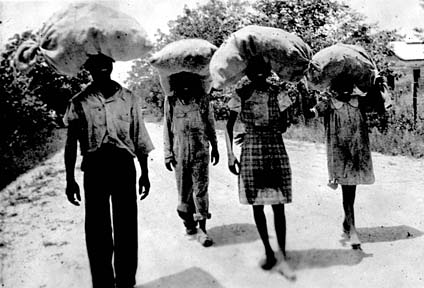
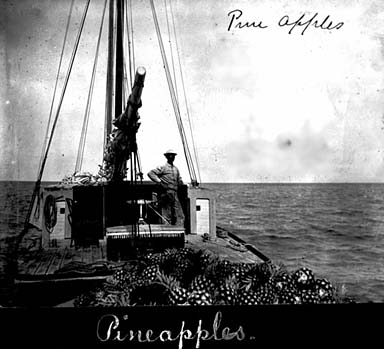
Pictures of Bhamian Migrants selling pineapples and working in Florida
Industries such as wrecking provided employment for many especially in the Southern Bahamas but, the placement of lighthouses and the creation of charts for sailors led to the demise of this industry. The agricultural sector also faced challenges as farmers also had difficulty getting crops to market due to the archipelagic nature of the country. This resulted in spoilage and poor quality of crops which negatively impacted the export products such as pineapples, citrus and sisal. A series of hurricanes also destroyed the sponge beds so in the 1930s this industry also suffered dramatically. Relief however came for many Bahamians from the United States’ Farm Labour Programme commonly known as “The Contract” in 1943. Under this programme, Bahamians signed seasonal contracts to provide farm labour across America; the remittances earned boosted the economy of many islands.
The Contract is the best know migration story but, it is not the only one. Records show that Bahamians began migrating to Florida as early as 1890 for seasonal agricultural work and at one point; the exodus to Florida was so great that, from 1900 to 1920 one fifth of the Bahamian population went to Florida. They worked on farms and also got jobs at the resorts across the state. Bahamians also provided a heavy labour component for Henry Flagler’s Florida East Coast Railway in the 1900s. In fact, Herbert Wells, the first black hired by Florida East Coast was a Bahamian and at the time of his death he was hailed as a pioneer of Florida.
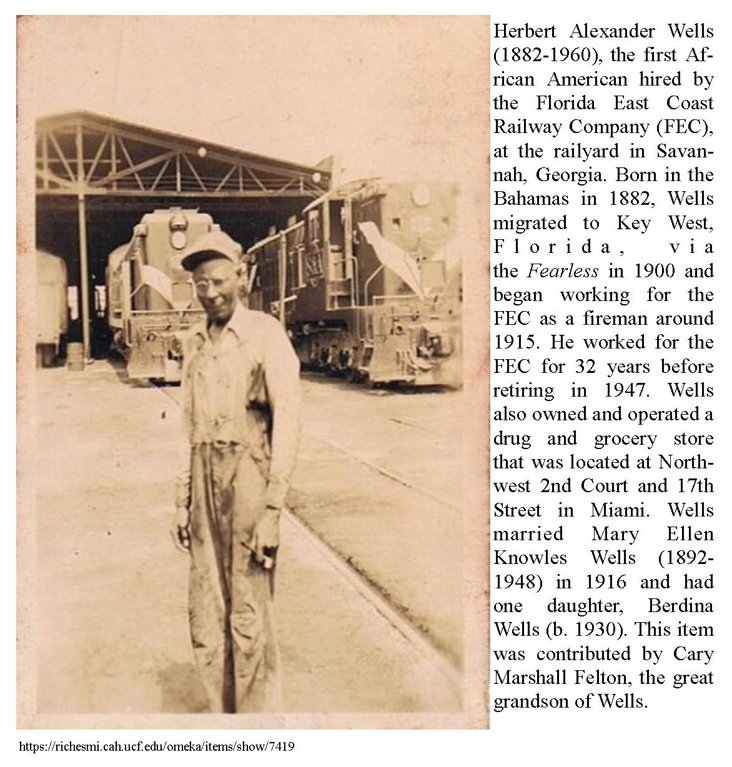
From
1900 to 1912 Bahamians were recruited to cut cane in the Dominican Republic
but, there was no great exodus this time as there were laws designed to restrict
“coloured immigration”. Prior to that
between 1895 and 1908 Bahamians went to Panama as West Indians were commissioned
to work on the construction of the ambitious Panama Canal. Unfortunately, exposure to diseases like
malaria and typhoid fever were high, the West Indians were also assigned the
more dangerous job of dynamiting. Complaints
were made to the British colonial authorities, but intervention came too late
for many. In addition to Panama, Bahamians were also contracted to work in
Costa Rica, Honduras and Guatemala on the United Fruit Company and the Atlantic
Fruit Company plantations, as well as the Cárdenas/Monterrey Division of the
National Railways of Mexico and the Mexican port of Tampico. The conditions in Central America were so
harsh and unfavourable that many returned in worse conditions than they left
suffering from disease and disability. In addition to their harsh treatment, their
contracts were sometimes not honoured, further, monies were not sent home
instead, wages were taken and passages home were denied. Bahamians therefore left seeking employment
opportunities in the United States but, while conditions were better, they
still faced danger and discrimination. To
their credit, it was said that when contracts were not honoured and employers
did not live up to expectations, Bahamians would leave in mass numbers. One of the primary reasons were, in many
countries, they faced a level of prejudice and discrimination that they were unaccustomed
to in the Bahamas. Bahamians therefore
opted to return home, preferring to be free and poor than to suffer injustices.
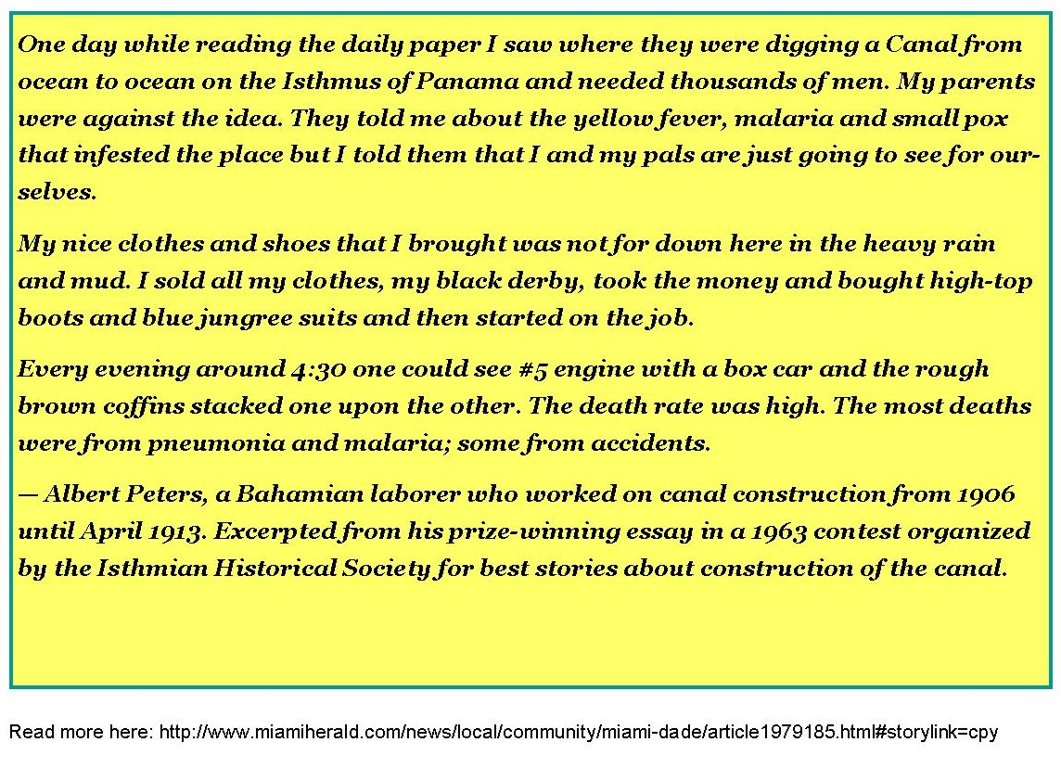
SIMPLE DEMOCRACY
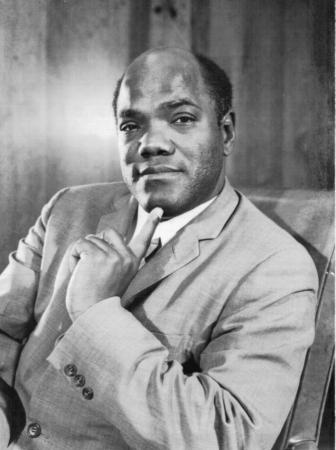
"I
am not afraid to go the limit if your rights are challenged. The time is
coming when we will have to go the limit simply because men who we put into
positions in the House of Assembly have forgotten who put them there and are
being used by your enemies for our own destruction. It is simple
democracy that when representatives fail to do the people's wish that we the
people have to whip them back into line." Excerpt from speech given
on Windsor Park on August 8th, 1958."
Randol Fawkes
Faith That Moved The Mountain
www.sirrandolfawkes.com
Remembering the Sedition Trial of Randol Fawkes
August
9, 1958 Randal Fawkes was arrested for sedition and accused of making a
seditious speech during a union meeting on Windsor Park. This entire incident
stemmed from activities which occurred during a visit to the Bahamas Lumber
Company, Mastic Point, Andros by Randal Fawkes and L. Garth Wright. These
gentlemen were there at the invitation of labourers who were happy to see them and
receive words of encouragement.
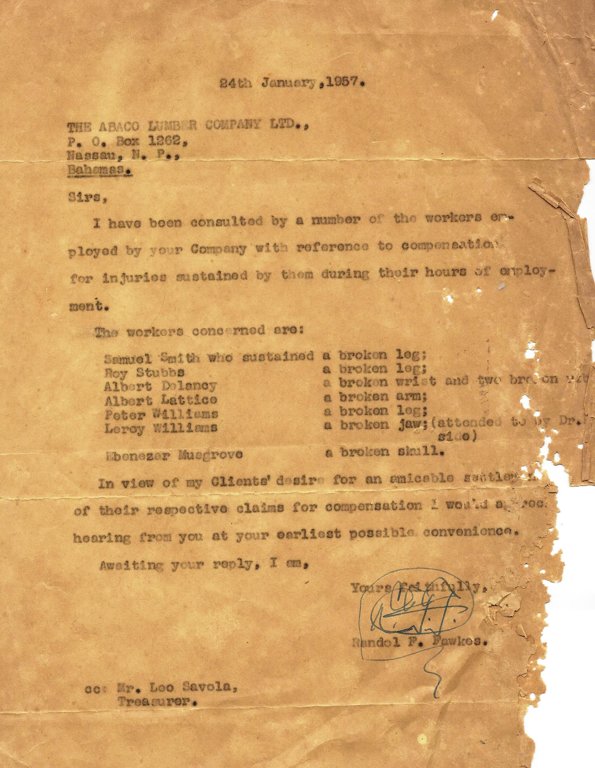
Conditions
at the camp were terrible. Fawkes and Wright witnessed persons with broken or
sawed off bleeding limbs. They also worked long hours for very low wages.
Workers also suffered the indignity of the Truck and Tommy Shop System where
they received things like food, drink, rent and tools from the boss’ Commissary
Shop rather than actual wages. This was a little more than slavery, and just
another tool used to exploit workers and keep them under the bondage of their
oppressors. Further, the lumber camp was loud and filthy with mounds of sawdust
everywhere and toilets in the centre of the yard. There was no clean living
area for the families of the workers so they had to endure constant noise and
filth consequently, the children were often sick. A meeting was organized and the union activist
spoke out against the obvious exploitation which angered the boss, Mr. William
N. Russell. He then demanded that they leave, when they did not, he stormed out
of the meeting vowing to get them, and he was true to his word. Firstly, a few
days later, Richard Horton, a worker who befriended the activist, was fired and
asked to vacate the property by 6:00p.m. or face prosecution for trespassing,
he had no choice but to leave. This
however, was not the end, but the beginning of a showdown between Mr. Fawkes
and his adversaries.
When he
returned to Nassau, Mr. Fawkes was charged with trespassing and disorderly behavior
in relation to his activities at the lumber camp. Magistrate Maxwell Thompson
gave him a suspended sentence and he was bound to keep the peace for 3 years
which meant that he could not hold any labour meetings, picket or involve
himself with labour organizing or activism. In response, Mr. Fawkes did the
unthinkable; he held a monster meeting at Windsor Park and spoke vehemently
against colonialism and the minority government, the following day he was
arrested for sedition. When asked to make a statement, Mr. Fawkes wrote, “The
Bahamas Government is the most corrupt system I have ever seen in my life”. The
paper was then snatched from his hand because this was obviously not the
statement they wanted. He was then formally charged but was granted bail on the
condition that he held no more mass meetings and or demonstrations. Brother
Fawkes was then released to the triumphant shout of the masses that walked to
the Bahamas Federation of Labour (BFofL) Office on Wulff Rd. where a mass
prayer meeting was planned.
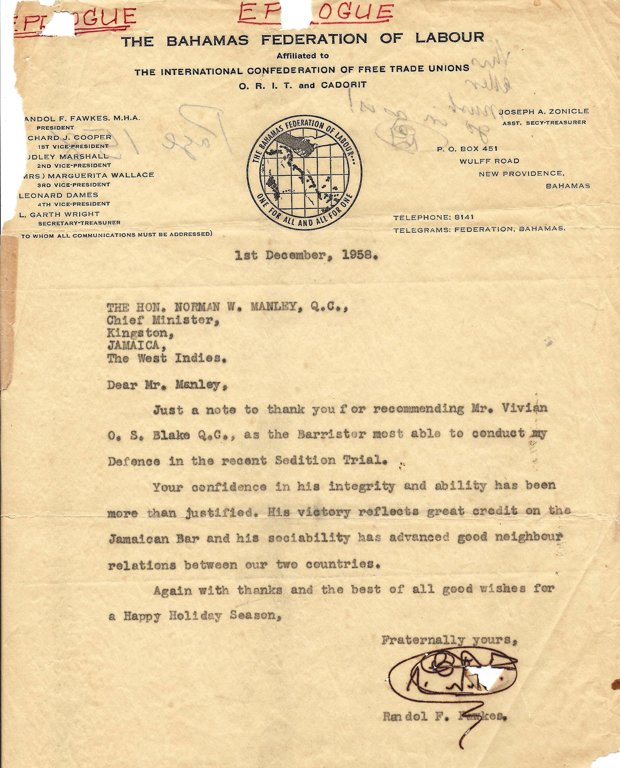
Mr.
Fawkes then began executing the plan for his defense appealing to Premier
Norman Manley of Jamaica because he was not on good terms with the Bar
Association. Mr. L. Garth Wright was also dispatched to New York to ask the
comrades overseas to apply pressure by keeping the sedition case before the
world press. Unfortunately, on the eve of the trail some of the members of the
BFofL broke ranks and formed the Bahamas Trade Union Congress and L. O.
Pindling, Milo Butler and Clarence Bain went abroad until the trail was over.
Fawkes was also tortured by the press, called profane names by the UBP and the
PLP labeled him a nut. The ordinary
workers remained steadfast contributing to the Fawkes Freedom Defense Fund.
This
was indeed, the trail of the century, with His Lordship, the Chief Justice Sir
Guy Henderson, Edward P. St. George Acting Solicitor General and Vivian O. S.
Blake, the youngest Queen’s Counsel in the British Empire as representative for
the defense. The entire jury, with the exception of one black juror was white;
the odds were clearly stacked against Mr. Fawkes. Mr. St. George was sure of
his victory but, young Mr. Blake was up to the challenge and this resulted in a
shocking turn of events.
Before
the crown could prosecute Mr. Fawkes for Sedition, Mr. Blake challenged whether
his actions on the night in question met the definition of sedition, placing
the Crown’s case in a precarious position. Mr. St. George began his case
confidently, but the strong and logical argument of Mr. Blake created a huge
stumbling block, and he (Mr. St. George ) not only stumbled to argue his case, but to maintain his
composure. Mr. Fawkes however, had no fear, when the case was adjourned for his
Lordship to consider Mr. Blake’s argument, the BFoL poured concrete for the
House of Labour.
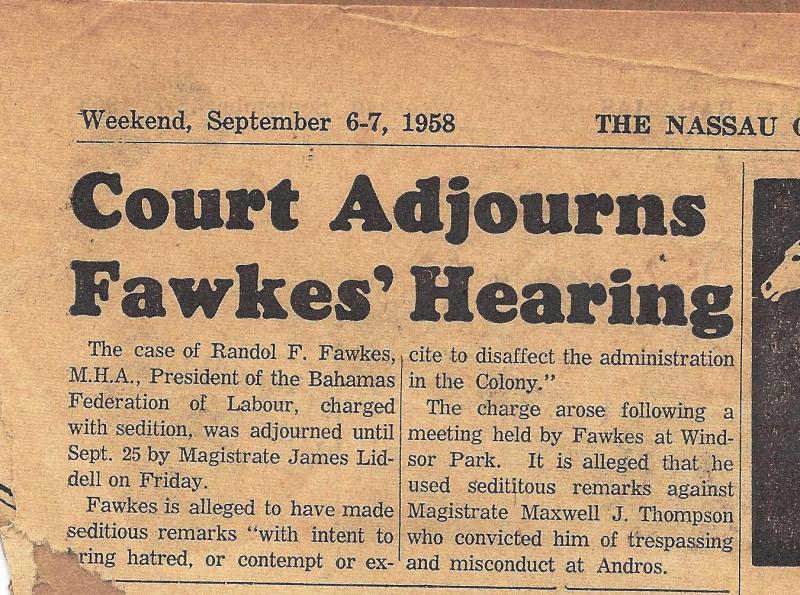
When
the case resumed, the court was packed with many refusing to work until the
verdict was read and they were not to be disappointed, the Chief Justice
verdict was that Mr. Fawkes had no case to answer. It was not the verdict the
oppressors had expected but, one met with jubilation at the meeting at Windsor
Park that night. Mr. Blake was received with a thunderous applause and urged
the brothers and sisters not to harbour malice or hatred as it would impede the
march to freedom. When Brother Fawkes spoke he was grateful and appreciative of
the support he received from the common working man throughout his case. He
then turned his sights towards a new battle, one for the security of employment
for all, he promised to build Jerusalem. This was a generation ago, and today
as I look out I tragically see no Jerusalem. New enemies have arisen from those
who were once comrades, our people seem unsure of themselves and activism and
unionism have become dirty words. Unions who were once strong and powerful,
standing steadfast against our oppressors, have lost their thunder. The common
working man who stood shoulder to shoulder with their labour leaders shutting
down the country for 19 days during the General Strike are unable to demand the
rights their forefathers fought for. The fire that ignited the Burma Road Riots
is no more; we Bahamians have seemingly
become prisoners of our own collective apathy and complacency, a shadow of the
courageous people that existed a generation ago. The question I have is, if
Randal Fawkes was our Moses, who will be our Joshua?
If you wish to learn more about Sir Randol Fawkes, The Father of Labour, please visit www.sirrandolfawkes.com, I also encourage you to read The Faith That Moved The Mountain by Sir Randol Fawkes.
Labour Day Has Changed!
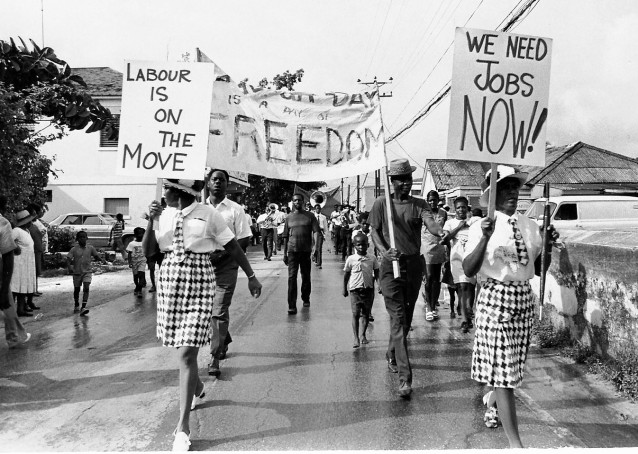
Labour Day Has
Changed. In the past, Labour Day held
greater significance, you would see men, women and children smartly attired
their pride on full display. It was a
day of Freedom, when unions took their issues to the street . Despite the fun they surely had, the issues of the day, were foremost in
their minds. They were principled and
conscientious, today many of us are not as concerned with issues that are not
directly impacting us, but back them, they were unified and despite the risk,
they were prepared to speak out. Case in
point, in 1962, the workers of this nation stood in solidarity with those who
were unemployed in an unemployment march, today, the unemployment rate is 14.8%
(Department of Statistics 2015 Labour Force Survey), but
many of us who are employed, have little concern for the suffering of our
unemployed brothers and sisters.
The Doris Johnson 1959 Speech
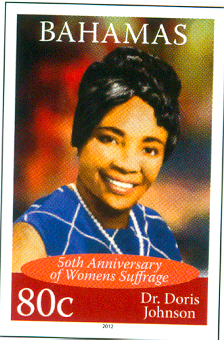
Taxation without representation.
The plight of delinquent girls being taken to lightly.
The need for "Housing Schemes" and "Slum Clearance ".
Read and Share.
Ship of State
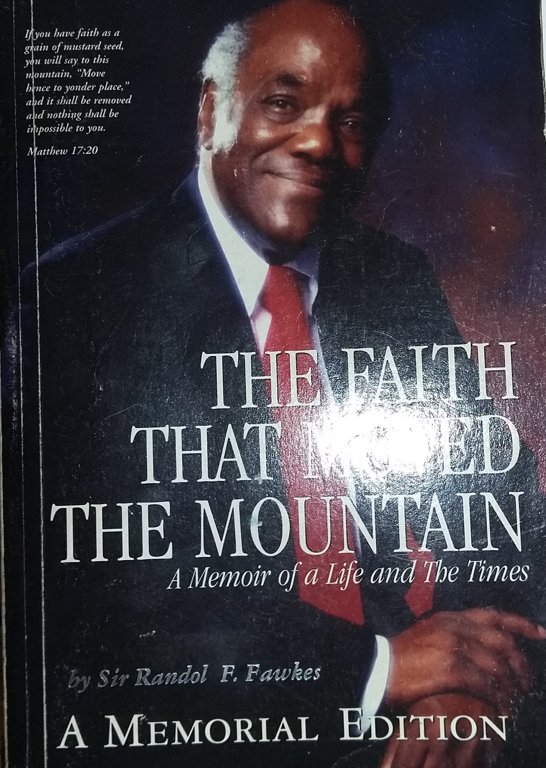
Commentary on the Ship of State, page 327 of "The Faith That Moved The Mountain, A Memorial Edition" by Sir Randol Fawkes.
School's Out, The 1981 Bahamas Union of Teachers' Strike
In January 1981, the Bahamas Union of Teachers headed by Ellison
K. Minnis (President) and Leonard Archer (Secretary General) lead a three-week
strike for improved pay and better working conditions. It is estimated that about 2,000 teachers
took part in the strike, before a settlement could be reached, there would be
clashes with police and the arrest of several teachers.
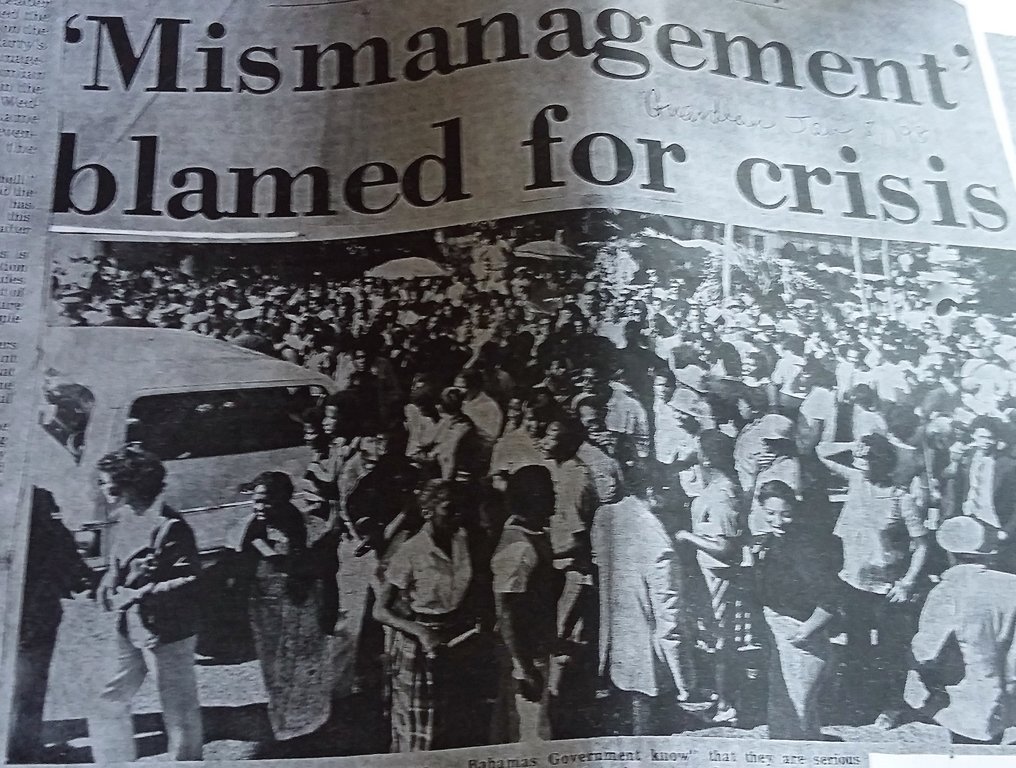
Mr. Archer announced the strike on 5th January,
1981 and public schools across the country were brought to a standstill. This strike was by no means passive, but
confrontational, the Nassau Guardian reported that the teachers, joined by
students and members of the public “took Bay Street by storm”. The crowd paraded around the House of
Assembly stating that “We Want Moses” at other times calling for “Judas”. It must have been a very tense environment
with several Members of Parliament and Prime Minister Pindling himself, on one
occasion not leaving during the lunch break at the usual time or taking an
opportunity to face the crowd (Nassau Guardian 8th January, 1981).
This situation being made more heated by the knowledge that
several teachers were arrested, namely Patricia Collins, Charles Wildgoose and
Joan Carey (R. M. Bailey Senior High) and Leonard ‘Boston Blackie’ Miller,
Elkanah Major, Philip Dorsette and Wade Taylor (Government High School) and
later brought before the court. The
Minister of Education and the Prime Minister both claimed that the Government
simply did not have the funds to meet the teachers’ demands. Norman Solomon,
leader of the Official Opposition however stated that the government “crowed
about its projected 25-million-dollar surplus for 1981” “now that same
government is saying we broke and cannot meet the teachers’ demands.”
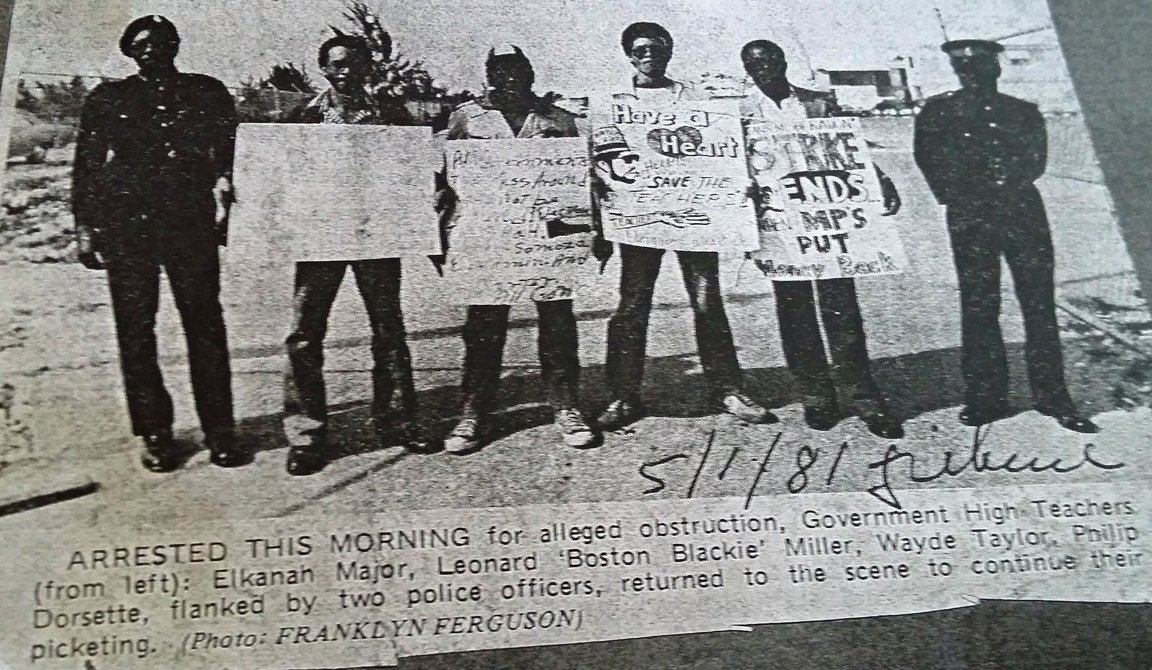
The teacher’s returned to the classroom 26th January, 1981 but only to performed essential duties until a settlement could be reached. The union returned to the bargaining table 2nd February, 1981 and the strike ended 3rd February, 1981. The final settlement was $1,200.00 per annum salary increase for all teachers which amounted to the largest increase in the union’s history. The Union was also able to achieve Hardship Allowance for Family Island teachers, and Government commitment for a renovation scheme. Mr. Minnis stated that “never before in the history of the Union, has there been so much solidarity on the part of the Union,”. Mr. Minnis also said “It is the first time that any government department has taken strike action against the government.” Today, the Bahamas Union of Teachers remain one of the strongest unions in the country, but the financial security and benefits which teachers enjoy today, was achieve through the sacrifice, commitment and determination of teachers a generation ago.
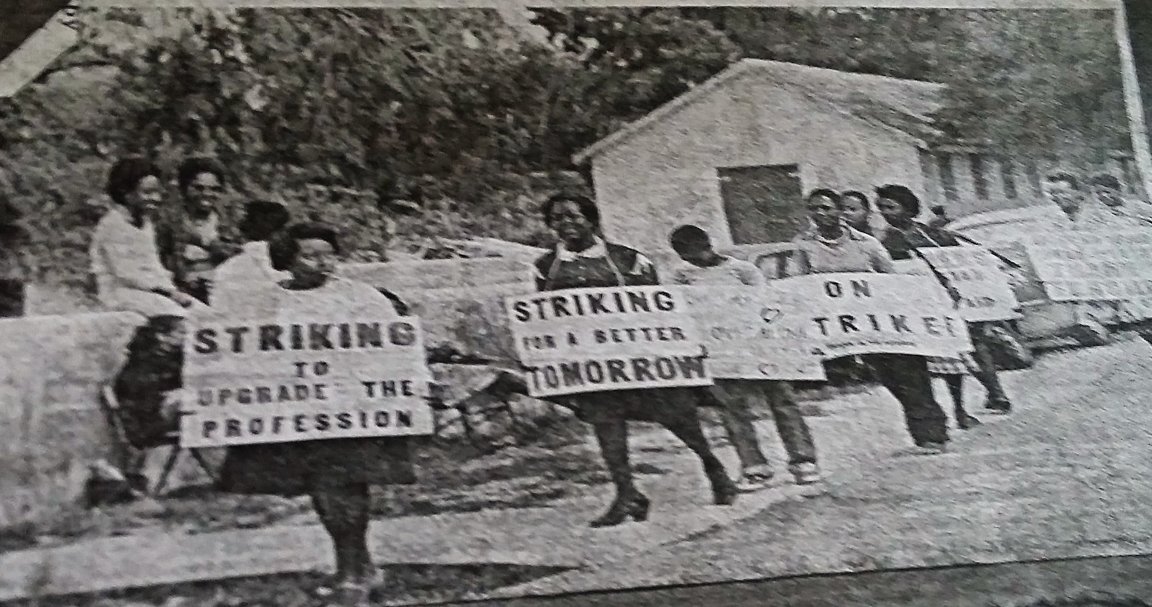
Lost Fire
When we look through the
pages of Bahamian history, it’s hard to ignore the contributions of the trade
union movement. From the Burma Road
Riots, to Majority Rule, Independence, National Insurance etc. unions made a contribution
to the development of this nation. The
unions were not simply seeking to secure things such as better working
conditions, they had an even more noble cause, the crafting of a better
Bahamas. Many ordinary Bahamians stood
in solidarity with men like Randolph Fawkes and Clifford Darling, and put their
shoulders to the wheel and pushed this nation forward so that this generation
would have a brighter day. The leaders had
the support, trust and confidence of the membership, and members of the wider
community. Their commitment toward
national development transcended the trade union movement and made its leaders,
national heroes.
Today’s trade union
leaders no longer enjoy that level of support and strength, many say the fire
has gone out and unions are now struggling to remain relevant. In some segments once legendary trade unions
are fighting for their very existence.
Those that are seemingly healthy are embroiled in court battles and
internal disputes, they are shadows of their former selves, seemingly unable to
mount a creditable defence without the support of government. Yet while we celebrate our once glorious
history, we must also look to ourselves to see where we went wrong. This problem requires introspection and
honesty and the leadership must be willing to humble itself and look
within. Yet the level of humility that
is necessary, is absent with many dismissing the crisis that stands before us
but, many are overwhelmed and too prideful to ask for help. Others are also too small and lack the
necessary resources to maintain the organisation so the membership suffers. If unions are to survive in the Bahamas, they
must retool and reinvent themselves.
Members must become more involved as the unions are not the sole
responsibility of the leadership, everyone must use their skills and talents to
advance the organization. Those that lead must allow others to be involved,
listen to all members, and make everyone feel included, because people could
easily become frustrated and leave.
There must also be transparency, adherence to proper procedures and a
willingness to serve, if we do not, unions in The Bahamas will continue to
decline until, they are no more.